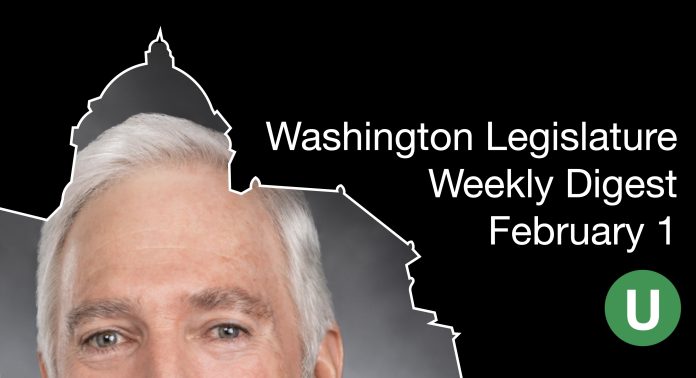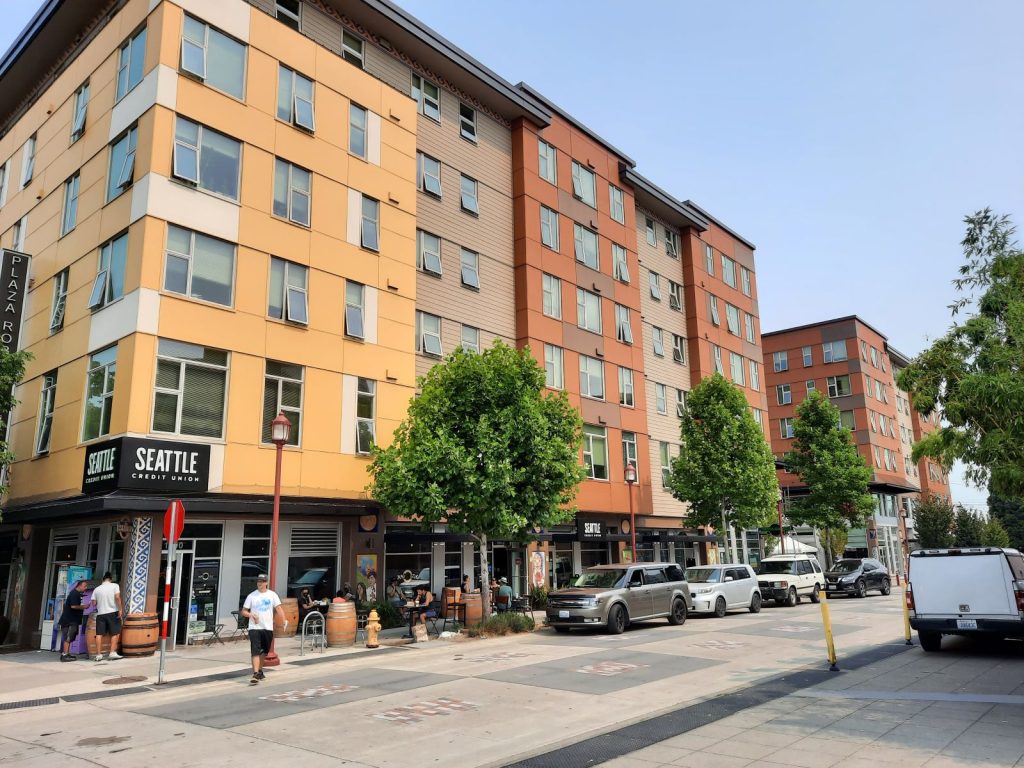In this WALeg report, predictable opposition arises against missing middle housing bills.
- Also in this digest:
- Important Bills at a Glance.
- The Week’s Focus: Condominium Act reforms.
The legislature’s housing bills faced a small tempest of push back this weekend. Former chair of the House housing committee and legislative zero Gerry Pollet showed why he was relieved of that committee position by firing off a Facebook missive attacking HB 1110. This was picked up by the Seattle Times Editorial Board for a screed opposing the bill. And Councilmember Alex Pedersen had to get his Plan Loser teeth into the fray via his newsletter.
Normally, The Urbanist would devote some time to dismantling the thousands of words that they spilled, but all the fervor boils down to one core. Despite posturing in defense of affordable housing, the Pollet/Seattle Times/Pedersen position is “good luck plebs, we got ours.”
The Pollet/Times/Pedersen (PTP) argument is as follows: Today’s housing crisis is perfectly acceptable until someone comes up with a magical plan that simultaneously:
- Preserves municipal control over every bit of zoning,
- Creates only housing available at half the current price,
- Ensures all such housing is concentrated on arterials,
- Ensures all such housing is constructed bespoke on each lot by artisans who have no ties to any sort of larger organization or, god forbid, a “developer”, and
- Still allows neighbors to block a project because it might brush against a tree.
Now, here’s the trick. The Times has already come out against I-135, a plan funding quality, sustainable, affordable, social housing without touching municipal control. But because it is a new program to build houses that hasn’t spent 50 years contributing to sprawl or Seattle Times’ bottom line, they get to beg the question of whether it will ever be able to build houses. Change is the enemy. Plans to change are even worse.
And that’s the game. These boys don’t have interest in affordability any more than they have in a legitimate debate. They are securely housed, stoking fear among a shrinking minority in the same position. In the case of the Seattle Times-owning Blethens, that housing has been paid with generational wealth accrued through decades of advertising redlined and segregated housing built by — gasp! — developers. The PTP axis is the epitome of pull up the ladder after reaching safety, and their housing opinions should be understood as such.
For the rest of us who are still participants in the housing market, skip their segregationist Boomer bloviating and spend your time signing in pro to support HB 1110 for missing middle and SB 5466 for transit-oriented development. And if you’re in Seattle, don’t forget vote for I-135.
Important Bills at a Glance
- HB 1110 – Missing Middle
- HB 1181 – GMA Climate Change provisions
- HB 1045 – Evergreen Basic Income pilot
- HB 1026 – Local Government Design Review Reform
- HB 1131 – WRAP Act (bottle deposit and packaging reform)
- HB 1040 – Aviation and Aerospace Advisory Committee
- SB 5466 – Promoting Transit Oriented Development
- SB 5383 – Concerning Pedestrians Crossing and Moving Along Roadways
- HB 1124 – Protecting Tenants from Excessive Rent and Related Fees
- HB 1388 – Protecting Tenants By Prohibiting Predatory Residential Rent Practices
- HB 1389 – Residential Rent Increases Under the Landlord Tenant Act
HB 1110/SB 5190 – Increasing Middle Housing In Areas Traditionally Dedicated to Single Family Detached Housing
- Lead Sponsors: Rep. Jessica Bateman (D – Olympia) and Sen. Yasmin Trudeau (D – Tacoma)
- Link: the House Bill, the Senate Bill
- Description and Notes: Missing middle housing legislation allowing fourplexes everywhere zoned single family and sixplexes near transit
- Current Status – HB1110: No change since Jan. 17 – Public hearing in the House Committee on Housing at 4pm
- Current Status – SB5190: No change since Jan. 25 – Scheduled for public hearing in the Senate Committee on Housing at 1:30pm
- Resources: In addition to the above response to Rep. Pollet, CM Pedersen, and the Times’ thin arguments against the bills, please check out The Urbanist’s team breakdown of this very important legislation.
HB 1181/ SB 5203 – Improving the State’s Response to Climate Change by Updating the State’s Planning Framework
- Lead Sponsor: Rep. Davina Duerr (D – Bothell) and Sen. Liz Lovelett (D – Anacortes)
- Link: the House Bill, the Senate Bill
- Description and Notes: Reintroduction of last session’s HB 1099, a bill to compel jurisdictions to put climate change provisions in their Comprehensive Plans.
- Current Status – HB1181: Jan. 20 – Substitute bill passed out of committee with amendments to:
- Shift setbacks for development against wildfire ares to “create open space buffers”
- Drop communication with “all public entities” about utility information
- Drop “multimodal” level of service requirement to just be level of service analysis
- Create process for Commerce to create guidelines and approve GHG plan elements
- Jan. 27 – Referred to Appropriations
- Current Status – SB5203: No change since Jan. 17 – Public hearing in the Senate Committee on Local Government, Land Use & Tribal Affairs at 8:00am.
- Resources: Please see December’s Meetup with Futurewise and Futurewise’s campaign page.
HB 1045 – Creating the Evergreen Basic Income Pilot Program
- Lead Sponsor: Liz Berry (D – Seattle)
- Link: the House Bill
- Description and Notes: Monthly payment equal to the county’s fair market rent at the time of application for 7,500 pilot recipients. Kicks off July 1, 2024. Eligible: adults with income less than 200% of the federal poverty level with transitions or conditions associated with high economic instability: pregnant, kid under five, homeless, immigrant, refugee, asylee, exiting foster care or justice system, domestic violence, disability, or behavioral health disorder.
- Current Status: Jan. 24 – Substitute bill passed out of Human Services, Youth, & Early Learning with amendments to:
- Collect demographic information on participants.
- Contract with 3rd party org to design and implement a program evaluation
- Add EBI for referral to housing programs
- Add hospitals to not consider EBI in billing
- Jan. 26 – Referred to Appropriations
- Resources: We have a South Park pilot of Guaranteed Basic Income, and Scientific American’s recent look at Universal Basic Income.
HB 1026 – Local Government Design Review Reform
- Lead Sponsor: Amy Walen (D – Kirkland)
- Link: the House Bill
- Description and Notes: Limits design review for housing to administrative design review and drops public meetings by external boards. Has the potential to overcome predatory delays by removing the local power to require public meeting design review for housing.
- Current Status: Jan. 19 – House Committee on Housing, majority recommends passing substitute bill that carves out an exemption, allowing design review for historic districts.
- Jan. 23 – Referred to Rules 2 Review.
- No change since Jan. 24 – Rules Committee relieved of further consideration. Placed on second reading.
- Resources: The Urbanist’s coverage of Seattle’s need to overhaul design review and the first tacit steps.
HB 1131 – Improving Washington’s Solid Waste Outcomes (WRAP Act)
- Lead Sponsor: Berry
- Link: the House Bill
- Description and Notes: Producer responsibility for packaging and paper products, postconsumer recycled content requirements, bottle deposit standards, and amendments to solid waste management.
- Current Status: Feb. 2 – Scheduled for executive session in the House Committee on Environment & Energy at 8:00 AM (Subject to change).
- Resources: Check out Ashli Blow’s article introducing us to the Washington Recycling and Packaging Act (WRAP Act) and the need for it now.
HB 1040 – Aviation and Aerospace Advisory Committee
- Lead Sponsor: Walen
- Link: the House Bill
- Description and Notes: Aerospace and aviation advisory committee putting together a list of the industry’s strengths and needs for the Secretary of Transportation. Lots of representation on the committee from aerospace and aviation, but only one rep from a “statewide environmental organization.” The committee’s consideration of greenhouse gases is item F after expansions and tech considerations.
- Current Status: No change since Jan. 11 – Scheduled for public hearing in the House Committee on Innovation, Community & Economic Development, & Veterans at 8:00am.
- Resources: A very extensive article from the Journal of Air Transport Management about the outsize impact that aircraft have on greenhouse gases and the possibility of net-zero business models, should that be a higher-than-F level priority.
SB 5466 / HB 1517 – Promoting Transit Oriented Development
- Lead Sponsors: Marko Liias (D – Edmonds) and Rep. Julia Reed (D – Seattle)
- Link: the Senate Bill, the House Bill
- Description and Notes: A bill requested by the Governor’s Office that acts as a complement to HB 1110’s missing middle push. Encourages denser housing near rapid transit.
- Current Status: Jan 19 – First reading, referred to Local Government, Land Use & Tribal Affairs.
- Jan 31 – Public hearing in the Senate Committee on Local Government, Land Use & Tribal Affairs.
- Resources: The Urbanist did a big breakdown of the bill from January and also has done a little coverage of transit-oriented development (TOD) in the past. And some good info on this TOD bill from Sightline Institute.
SB 5383 / HB 1428 – Concerning Pedestrians Crossing and Moving Along Roadways
- Lead Sponsors: Sen. Rebecca Saldaña (D – Seattle) and Rep. Emily Alvarado (D – Seattle)
- Link: the Senate Bill, the House Bill
- Description and Notes: Concise and to the point. “A pedestrian may cross a roadway at any point unless a reasonably careful person would realize there is an immediate danger of a collision with a moving vehicle, a person operating a bicycle, or personal delivery device.” Then it supersedes all local rules to the contrary.
- Current Status: No change since Jan. 16 – First reading, referred to Transportation.
- Resources: See WALeg Week 2 – Weekly Focus with the troubling origins of “jaywalking” and the ways removing these laws makes the streets safer.
HB 1124 – Protecting Tenants from Excessive Rent and Related Fees
- Lead Sponsor: Strom Peterson (D – Lynnwood)
- Link: the House Bill
- Description and Notes: A landlord may not increase the rent paid by a tenant in an amount greater than 5% above the base rent without providing written notice between 180 and 220 days before the increase takes effect. First month and security deposit fees may not exceed one month’s rent. Brings the state in line with Seattle’s 180 day notice requirement.
- Current Status: Jan. 26 – Substitute bill passed out of committee with amendments to clarify when rent includes utilities.
- Jan. 30 – Referred to Rules 2 Review
- Resources: See WALeg Week 3 – Weekly Focus with the difference between rent stabilization bills like these and the misnomer “rent control” that gets dropped pejoratively against any sort of benefit for renters.
HB 1388 – Protecting Tenants by Prohibiting Predatory Residential Rent Practices
- Lead Sponsor: Nicole Macri (D – Seattle)
- Link: the House Bill
- Description and Notes: A landlord or trailer park property owner may not:
- Increase to an excessive rent
- Charge more burdensome rent or fees between month-to-month or longer
- Charge move in fees or security deposits more than one months rent.
- Gives the State AG power to enforce with civil penalties. Excessive rent is defined as the greater of 3% or inflation up to 7%.
- Current Status: No change since Jan. 11 – Scheduled for public hearing in the House Committee on Innovation, Community & Economic Development, & Veterans at 8:00am.
- Resources: See WALeg Week 3 – Weekly Focus with the difference between rent stabilization bills like these and the misnomer “rent control” that gets dropped pejoratively against any sort of benefit for renters.
HB 1389 – Residential Rent Increases Under the Landlord Tenant Act
- Lead Sponsors: Alex Ramel (D – Bellingham)
- Link: the House Bill
- Description and Notes: Landlord may not increase rent more than the rate of inflation as measured by the consumer price index or 3%, whichever is greater, up to a maximum of 7% above the existing rent. Exceptions for less than 10-year-old buildings, public housing, improvements beyond maintenance, and a hardship exemption. Also creates a “banked capacity program” where, with notice, the landlord can skip increases and store up to 3% per year.
- Current Status: Jan. 17 – First reading, referred to Housing.
- No change since Jan. 24 – Public hearing in the House Committee on Housing at 4:00pm
- Resources: See WALeg Week 3 – Weekly Focus with the difference between rent stabilization bills like these and the misnomer “rent control” that gets dropped pejoratively against any sort of benefit for renters.
This Week’s Focus: Condominium Act Reforms
There is a misconception about condos where many people consider them analogous with apartments. However condominium is not a type of building but an ownership structure. Broken apart, the words mean “con-” or together and “dominium” or right of ownership. The Revised Code of Washington (RCW) defines a condominium as “real property, portions of which are designated for separate ownership and the remainder of which is designated for common ownership solely by the owners of those portions.”
As such, most legislative sessions feature a few bills that tweak parts of the state’s Condominium Act (RCW 64.34). This year is no exception as there are currently 20 bills proposing changes to that part of the code. Smaller fixes are made by legislation like HB 1101 that bars condo associations from requiring new buyers to submit criminal background checks. Other legislation like the big housing bills touch on the section to harmonize housing definitions across the code.
Then there is HB 1298. Sponsored by Rep. Spencer Hutchins (R – Gig Harbor), the bill looks to increase “the supply and affordability of condominium units and townhouses as an option for homeownership.” It does this by telling the condo board to hire a very specific kind of structural expert.
For this century, Washington’s Condominium Act has been considered an enormous barrier to developing affordable housing under condominium regimes. Since the 1990’s, the state has given condo buyers a four-year warranty on construction defects. In concept, this provides owners a protection to shoddy workmanship. In practice, it has resulted in unit owners commissioning consultants to seek out problems before the four years lapse. The owners can then sue the builders years after the company has left the job.

One of the more famous construction defects claims was made by the unit owners of 2200 Westlake, the tower over Whole Foods that was constructed in 2008 to be the gateway to newly emerging South Lake Union neighborhood. As part of a settlement, the property developer Vulcan had to do $26 million in repairs. The tower exterior was wrapped in scaffolding and replaced over some 13 months. While condo developments have since been constructed in the region, the questionable liability prevents them from being built at the scope to fill demand.
HB 1298 attempts to avoid some of the more egregious defects claims by raising the requirements for filing. Prior to filing suit, the condo owners need to inform the builder of their intent to sue and provide a written defect assessment report. This report has to be created by an inspector qualified to testify about the defects in court and is also not being paid based on the outcome of the case. Other provisions of the legislation exempt small townhome developments from the warranty.
The bill has made zero moves in the legislature this session. Since it covers the right to sue, it has been referred to the House Civil Rights and Judiciary committee instead of anyone dealing with housing. It has not been scheduled for a public hearing.
Ray Dubicki is a stay-at-home dad and parent-on-call for taking care of general school and neighborhood tasks around Ballard. This lets him see how urbanism works (or doesn’t) during the hours most people are locked in their office. He is an attorney and urbanist by training, with soup-to-nuts planning experience from code enforcement to university development to writing zoning ordinances. He enjoys using PowerPoint, but only because it’s no longer a weekly obligation.




